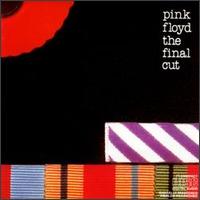


Take Heed of the Dream
Why The Final Cut is as relevant in 2003 as it was in 1983.
 Every once in a while, a tune--or, more likely, just a small snippet--gets stuck in my craw, and the only way to dislodge it is either to listen to the song itself, or listen to something else in the hope that it will replace it. I'm sure everyone has had the experience of getting some horrible song by that artist you hate with the white-hot intensity of hell's own fury lodged in their brain. My downstairs neighbor has a fondness for playing the absolute worst station in town, the one that plays mostly regrettable hits from the 80s, at volumes where I can't possibly ignore it. Inevitably, at some later point in the day, I find something by Bon Jovi doing laps in my cranial cavity.
Every once in a while, a tune--or, more likely, just a small snippet--gets stuck in my craw, and the only way to dislodge it is either to listen to the song itself, or listen to something else in the hope that it will replace it. I'm sure everyone has had the experience of getting some horrible song by that artist you hate with the white-hot intensity of hell's own fury lodged in their brain. My downstairs neighbor has a fondness for playing the absolute worst station in town, the one that plays mostly regrettable hits from the 80s, at volumes where I can't possibly ignore it. Inevitably, at some later point in the day, I find something by Bon Jovi doing laps in my cranial cavity.
The easy solution, naturally, is to overpower it with some Floyd. Something catchy works best, I find, like "Money".
On happier occasions, I find some bit of Floyd swirling around my head. Such was the case this morning, when the opening chords of "The Gunner's Dream" hit me. The Final Cut just isn't the album I reach for when I need a hot Floyd injection; it's too dark, too musically disjointed (no flow) for my tastes. In its favor, though, it is possibly the best-engineered and mixed album in the Floyd catalog. The drums sound better than any other of their albums certainly, and David's solo guitar tone is perhaps the most strident and confident of his career. His solo in the title track is easily one of his most inspired. It's simple, melodic, and packs a heavy punch that brings the song (and the album) to a climax. And though Rick's contribution is missed in some ways, the album makes up for it with gorgeous playing by guest stars like Michael Kamen and Raphael Ravenscroft.
Too many of the songs on the first side of the album, however, are regrettably bland and come off as filler. Roger's concept for The Final Cut is also somewhat of a mess, moving away from the clearer (by comparison, anyway), plot-driven focus of The Wall into the muddier, often confusing and inexplicable concepts of his later years. (A handicapped child simulates a nuclear war with his phone? Oookay...) The fact that the album is practically a sequel to the last album, "starring" one of the ancillary characters from that opus, reeks of a lack of inspiration.
I was about eight years old when the album came out, and I only discovered it after the "Roger" years were (more or less) long over, so the political subject matter always seemed distant and dated. Twenty years on, though, in Bush's America (and, arguably, Bush's world), the names have changed, but far too much is once again applicable. The gunner's dream of a better world from "The Gunner's Dream" hits home now just as much as ever:
A place to stay
Enough to eat
Somewhere old heroes shuffle safely down the street
Where you can speak out loud
About your doubts and fears
And what's more no-one ever disappears
You never hear their standard issue kicking in your door
You can relax on both sides of the tracks
And maniacs don't blow holes in bandsmen by remote control
And everyone has recourse to the law
And no-one kills the children anymore
No-one kills the children anymore
In this "War on Terrorism" and the resultant knee-jerk roll back of civil rights to combat it, we have once again regressed into McCarthyism or Anti-Fascism or the witch-hunts (and on and on) of yore. The human animal seems woefully willing to give into his worst impulses in the name of "security": racism, anger, revenge, fear... everything but compassion and understanding.
 The Final Cut |
Just like in 1983, we are once again in the grip of a fierce recession and the fiscal and legislative conservativism that almost inevitably results. "Our boys" are again being sent off to fight an utterly pointless war. (One could argue, defensibly, that Saddam Hussein needed to be removed from power, but to the British or American administrations that excuse was secondary to other, less immediate concerns. Regardless, the timing is suspect. The phrase "he gassed his own people!" is often invoked, but why wasn't this war proposed back when that was actually happening?)
It was, in fact, from Roger Waters that I first heard the phrase "Bleeding Heart" (in the context of his post-Floyd band) used, which caused me much confusion until years later. (One could note that he seems to have stopped using the phrase lately, but it's likely due to attrition than any deliberate attempt to distance himself from progressive liberalism in this conservative climate.) At the time, I never figured I'd apply that label to myself, but over the years, the dream espoused by Roger's gunner has come into sharp focus for me. It hardly seems like too much to ask: Everyone is cared for, everyone has respect for his fellow man. But the world simply doesn't work that way, they say. Well why not?
Perhaps because the rest of the world refuses to cooperate. Those darker impulses are much easier to heed. And getting even two people to agree is difficult, if not impossible. Getting the entire world is impossible. Though simplistic, people seem to fall into two groups, conservative and liberal, and these groups seem to have a fundamental disconnect between their very thought processes. As one pundit put it.
The "Strict Father" model of family morality that conservatives subscribe to is based on the hierarchical authority of the father who sets and enforces rules of behavior. Children are expected to learn self-discipline, self-reliance, and respect for legitimate authority. Obedience is emphasized; questioning of authority is little tolerated. Governmental social programs are seen by conservatives as rewarding a lack of self-discipline, of failing to becoming self-reliant. However, spending for the preservation of the moral order, for protection of the "nation as family," whether it is for defense or for building more prisons, is morally required.
Liberals, on the other hand, subscribe to a "Nurturant Parent" model. Children become responsible, self-disciplined, and self-reliant through being cared for, respected, and, in turn, caring for others. Open communications is emphasized; even the questioning of authority by children is seen as positive. Desired behavior is not obtained through punishment. Empathy and a regard for fair treatment are priorities in this model. Social programs are seen by liberals as helping both individuals and the greater society. The maintenance of fairness is a priority for government.
Taking the metaphor to its logical conclusion, however, a child can only happen when there are two parents. The truth, as it usually is, is somewhere in between. When society swings too far one way or another, abuses inevitably occur in direct relationship to the distance of the swing. One needn't look too far for examples of either, with the Holocaust on one side and the various failures of Marxism, though, honestly, I know which one's excesses I prefer. Isn't it better to err on the side of trying to help one's brethren? Yes, I know that if you give a man a fish, he eats for a day, but you teach him to fish and he eats for a lifetime, but can't we agree that it's hard to learn to much of anything when you're too hungry to see straight?
There is no arguing the power of The Final Cut. I know of few other albums so visceral, so unflinching in facing difficult questions and probing dark emotions, which is precisely why it's so hard to stomach. Most people turn to music, and, indeed art in general, for pleasure, for entertainment and for distraction from life's complications and problems. Witness the disparity between the profits of, say, Dumb and Dumber and Philadelphia, or, more pertinent to the subject at hand, Bon Jovi's Greatest Hits and The Final Cut. It would be nice if life were more of like a song from the former, all carefree sex and teenage whimsy, but even for teenagers, those moments are fleeting. Much as we try to escape, events like those of September 11 and the war in Iraq, or even just the day-to-day obstacles we all face, force us to acknowledge the harsh realities more often than we'd like.
As I admitted earlier, I do not listen to The Final Cut much, for precisely those reasons. (Alternately, I don't listen to Bon Jovi at all, if I can help it.) It's a tough pill to swallow. I suppose it's our job as human beings to acknowledge that the world Roger and company present to us exists, and to strive to ensure, however futilely, that it no longer does. Wouldn't it be nice to wake up to a place where The Final Cut wasn't relevant? I think John Lennon said it best:
You may say I'm a dreamer
But I'm not the only one
I hope someday you'll join us
And the world will live as one
Maybe someday, John. Someday soon, I hope.